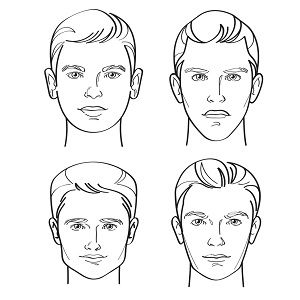Research shows mass production can make customised PPE
 Mask fit is difficult to achieve around the nose, chin and cheeks
Mask fit is difficult to achieve around the nose, chin and cheeks
Research published today has demonstrated the feasibility of mass producing customised respiratory protection for healthcare workers with a comfortable close-fitting seal, that is suitable for nearly 90% of face shapes and sizes.
Providing adequate filtering PPE for frontline healthcare workers has been a major challenge since the start of the pandemic, and the key issue in providing effective protection is the need for a close-fitting seal between the mask and the face.
However achieving mask fit across the full range of face sizes and shapes has proven difficult, and ‘fit-test’ failure remains a commonly reported occurrence. The areas of greatest variability, and where fit is most difficult to achieve, are around the nose, chin and cheeks.
Dr Sophie Cox, from the School of Chemical Engineering, who leads the University of Birmingham’s Centre for Custom Medical Devices worked with Birmingham researcher Dr Luke Carter, and Professor Owen Addison from Academic Centre of Reconstructive Science at King’s College London to determine a manufacturing route that will allow mass production of masks that fit the greatest possible number of people.
The researchers captured 3-dimensional face measurements from 200 people, with mixed facial form, gender and ethnicity, to ensure their sample was representative of the different facial shapes. They then performed statistical analysis which showed that a large proportion of people (87.5%) can be categorised into a relatively small number (nine) of designs for a rigid mask shell with an approximate fit to the person’s face.
The researchers achieved a close-fitting seal between the mask shell and the face using 3D-printed softened silicone, to deliver nine mask prototypes. The fit of each of these prototypes was demonstrated using a novel method to detect whether vapour could escape from the mask. The researchers further tested these designs on volunteer clinicians who had failed fit tests with commercially available half-mask respirators; each passed standard qualitative fit testing using the closest prototype available.
Dr Sophie Cox commented: “Doctors and nurses have consistently reported high rates of ‘fit failure’ with mass-produced masks, leaving them at higher risk of exposure to the virus. While the most desirable option is a fully customised ‘made to measure’ mask, this option would be prohibitively expensive. We have shown that the semi-customised approach, which is compatible with mass production, will provide a solution for nearly 90% of people.”
Both the University of Birmingham and King’s College London filed patent applications based on the research.
The technology is being commercialised by MyMaskFit. The company is working with technology, design and manufacturing partners to bring customised face masks to market. It has developed a face-scanning app for use on mobile devices that enables customers to scan facial dimensions, and securely transmit these measurements for rapid manufacturing. MyMaskFit will also pursue regulatory approval for custom-fitted, reusable, medical grade face masks.
ENDS
For further information please contact: Ruth Ashton, University of Birmingham Enterprise, email: r.c.ashton@bham.ac.uk.
Cox S et al. A feasible route for the design and manufacture of customised respiratory protection through digital facial capture is published in Scientific Reports.
About the University of Birmingham
The University of Birmingham is ranked amongst the world’s top 100 institutions. Its work brings people from across the world to Birmingham, including researchers, teachers and more than 6,500 international students from over 150 countries.
University of Birmingham Enterprise helps researchers turn their ideas into new services, products and enterprises that meet real-world needs. We also support innovators and entrepreneurs with mentoring, advice, and training and manage the University’s Academic Consultancy Service. Our portfolio of technologies available for licensing can be viewed at https://birmingham.portals.in-part.com.
About the Faculty of Dentistry, Oral & Craniofacial Sciences at King’s College London
King’s College London’s Faculty of Dentistry, Oral & Craniofacial Sciences is one of the foremost dental schools in the world. Recently rated in the top five in the world in dentistry by the QS World University Rankings 2021, the Faculty aims to maximise impact on health and wellbeing by integrating excellence across four areas:
- Education / teaching
- World-class science
- Clinical approaches
- Patient care
The Faculty’s mission is to understand disease, enhance health and restore function. Their vision is to be world leading in dental, oral and craniofacial education, research and clinical care. www.kcl.ac.uk/dentistry
About MyMaskFit
MyMaskFit is a company that was formed to develop and deliver safe, comfortable, reusable face masks for healthcare professionals and carers.
The company has built a supply chain with partners including RS Components, Autodesk, Newicon, Authentise, and working with Primasil, Cameron Price and supported by other UK companies including Ultimaker, 3DGBIRE to build custom fitted moulds, and achieve the medical standards with testing both in NPL, and INSPEC ahead of BSI qualification. MyMaskFit is based in Swansea and has worked extensively with the University of Swansea IMPACT team, and Plyable to assist in the sourcing, and design for manufacturing for a mass customised supply chain as part of Made Smarter’s Test Bed for Digital Supply Chain.